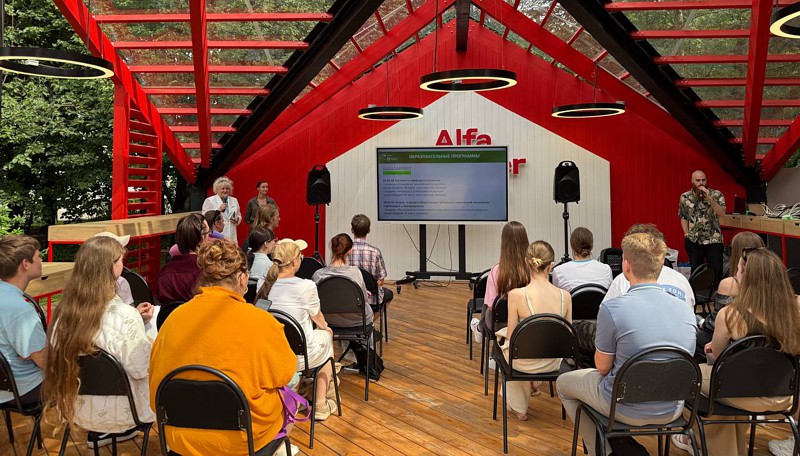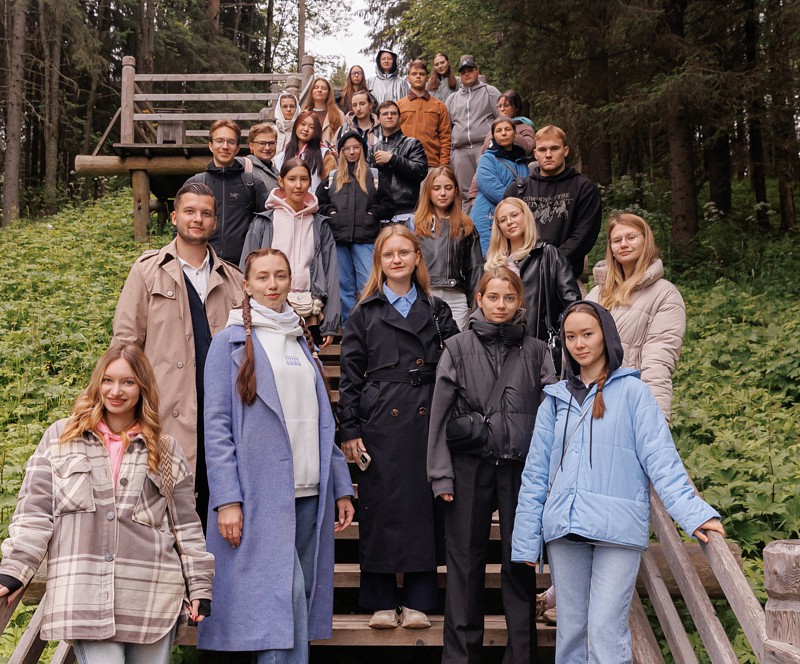“We strive to make science accessible to everyone,” the chair of the Student Scientific Society of the Institute of Environmental Engineering talks about Green Lab’s projects and achievements

The scientific research club competition “Project Initiative: Organizers and Leaders of Healthcare” from the Institute of Medicine won. Second place was shared between the scientific club competition “Olympiad Movement: Mathematics” from the Faculty of Physics, Mathematics, and Natural Sciences and “Forensic Medicine at RUDN University.” “Bronze” went to the scientific club competition in cardiology and the “Literary Salon” from the Institute of Russian Language.
We have decided to write about each of the scientific societies and clubs, starting with the best of the best. Its chairperson, Alexandra Erbaeva, a fourth-year undergraduate majoring in Ecology and Nature Management, shared the story of GreenLab’s creation, how the society supports students in their studies and personal growth, what sets the society apart from other student organizations at the university, and the future goals of GreenLab activists.
Tell us about GreenLab for those who don’t know about you yet. How would you describe the community in three words?
GreenLab is a community of students united by ideas and a desire to solve global problems of sustainable development and ecology. For several years, our community has been a symbiosis of science, travel, volunteering, and environmental education. We bring together not only young scientists and early-career researchers, but also anyone who considers caring for nature and the surrounding world part of their life’s journey. “Make science green again” is the GreenLab slogan we live by.
How and when did the community emerge, and where did it get its name? Who were its founders, and how has it evolved since its inception?
In 2019, a group of passionate students formed the university’s volunteer and educational commission, “Ecotunity”. Then, that same year, thanks to Ilya Vlasov from the Law School, the RUDN University Student Scientific Society began to be revived. Each academic department at the university began to restore the system of scientific mentorship and actively support student research. Our team was offered to organize the Student Scientific Society of the Institute of Environmental Engineering: some remained in Ecotunity, while others founded SciGoesGreen. Most of those students have already graduated—Maria Kuznetsova, Yana Krasnova, Dmitry Pogorely, Yulia Zavyalova, Denis Tsybizov, and others. They were true enthusiasts of their field, with a passion for learning and a sparkle in their eyes, as well as great energy and a desire to do things well, not just for show. Together, we were able to organize efficient work and fine-tune various organizational aspects, uniting and aligning research, environmental education, travel, and environmental stewardship.
In 2021, we rebranded and came up with a catchy and symbolic name. GreenLab means “green laboratory”. It simultaneously references the scientific and environmental components of the community. We considered many options, but settled on this one. We believe it captures everything GreenLab represents—a community of young researchers with a passion for discovering new paths to improve the environment around us. We currently collaborate with students not only from the Institute of Environmental Engineering but also from other faculties and institutes.
How many students are members of the Student Scientific Society? Who makes up the core group, and how are community responsibilities distributed?
The organizing committee consists of 15 members, while there are more than 100 activists and involved students.
What are GreenLab’s main areas of activity?
Our main activities include seminars, an intellectual games club, science popularization, and expeditions. We organize seminars and invite leading experts from various fields of ecology to visit us to share their experiences. Among them are scientists and ecologists from Caltech, the University of Helsinki, Skolkovo, Nanotech Industries, Constructor University Bremen, Moscow State University, the Higher School of Economics, institutes of the Russian Academy of Sciences, and other top-notch institutions. We also host TED Talks, where students present their short-term research, share experiences, and stories from past expeditions. This format helps students develop their public speaking skills.
We strive to make science accessible to everyone and actively promote it among schoolchildren, enrollees, and students. For example, we participate in The Open Days, the All-Russian Science Festival NAUKA0+, give lectures to schoolchildren, and help organize and host popular science events at our institute, such as the Decade of Environmental Science. At these events, we teach students the basics of hiking, promote a healthy lifestyle, demonstrate and explain how to distinguish minerals, properly sort waste, test water quality, create a DIY ecosystem, and much more.
We are environmental students, so expeditions and trips to nature are not only an important part of our specialty but also a great outlet. Our activists love these trips, and we help organize them. Together with academic staff our activists visit various Special Protected Natural Areas, and Student Scientific Society members help organize these trips as well. For example, we are currently organizing a trip to GreenLab Base Camp “Divnogorye” in the Voronezh Region. It will run from November 1st to 5th, and registration is still open. You can apply via the link.
What are GreenLab’s biggest achievements?
We are the recipients of the Russian Environmental Operator’s Green Award in the Education category and the Vernadsky National Environmental Prize in the Education as a Path to Sustainable Development category. We would especially like to highlight our contributions to major environmental reports. For example, we were cited as an example of scientific research efforts in achieving sustainable development goals in the report “ESG, Decarbonization, and Green Finance in Russia 2023/2024.”
Tell us about the most significant and exciting projects that Student Scientific Society has implemented over the past year?
Since 2021, we have been organizing eco-intellectual games, which are loved not only by students, but also by schoolchildren. Last year, several times we held “Ecomazgoboynya” for schoolchildren.
Another significant and noteworthy project last year was the first GreenLab Summer Fest for university applicants and school students, which took place on July 18. We held the event at Alfa Summer Space RUDN for those who wanted to learn about the Institute of Environmental Engineering, and to listen to lectures on travel and research, and enjoy themselves in good company. At the festival, our activists and organizers held master classes and gave lectures about their expeditions and scientific work. In addition, the KVN (Ka-Ve-En, “Club of the Funny and Inventive”) team “Kent” performed for them, and a quiz was organized. As a result, more than 90 people participated in our first festival.

How does participation in GreenLab help environmental science students in their professional and personal growth?
By participating in various events that we organize, students can develop different skills—from teamwork to expedition experience (sometimes in difficult conditions) and field research skills, which cannot always be acquired in the classroom. If we recall our TED Talks.Students format, for example. Here, students overcome their fear of public speaking, a skill and experience that is important not only for ecologists and scientists, but for everyone. When conducting masterclasses for enrollees and schoolchildren, we learn to interact with different audiences through interactive activities, learn to hold their attention, and teach them new things. Organizational activities also provide good teamwork experience. We develop the ability to listen and hear each other, to find compromises.
I can highlight some successful cases. In 2024, a team of first-year students (our regular activists) took first place in the 13th International Environmental Olympiad of Universities of the CIS countries. The same year, our activist Valeria Loseva won the “Ticket to the Arctic” competition, and just recently — the “Student Startup” competition and received 1 million rubles. This summer, Evgeny Voroztsov won a scholarship from Alfa-Bank. In 2024, I won the V.I. Vernadsky Foundation scholarship competition and the Presidential Scholarship, which allowed me to study in Kazakhstan for one semester.
Some of the activists are already building successful careers. For example, Anastasia Kireeva now she works at the Institute of Geochemistry and Analytical Chemistry of the Russian Academy of Sciences for her special achievements in geology.
What are your goals for the next year? What projects are you planning?
This semester, we are focusing on collaboration. On September 28, we will participate (including as partners) in the charity festival “From Heart to Heart,” organized by students at National Research Nuclear University MEPhI. In October, we are planning to go on a volunteer trip to the Prioksko-Terrasny Reserve. Together with the Institute of Oil and Gas Problems of the Russian Academy of Sciences, we will hold our beloved intellectual game “Ecomazgoboynya” for a wide audience. We are also in the process of creating a video program about the activities of environmental scientists. And in December, we plan to hold a School of Scientific Guides for students who want to try their hand at this role.
How can students become part of GreenLab?
You need to fill out an application form via the RUDN NSO bot — https://t.me/NSO_RUDN_bot.
We will process the application and then contact each applicant directly. We will discuss all the important points, wishes, and goals of the students, help them resolve issues related to science, and thus newcomers will become members of our NSO.
To read more about achievements and upcoming events:
Telegram channel — https://t.me/nsoecorudn;
Telegram channel about travel — https://t.me/greenlaboutdoor;
VK community — https://vk.com/nsoecorudn.

There are approximately 1,600,000 children in Russia with confirmed attention deficit hyperactivity disorder. The necessary therapy is not always available to their families due to cost or the lack of specialized centers nearby. Teachers and students at RUDN University and Altai State University have developed a special app for these children that increases attention and reduces anxiety using the color photostimulation method.
Student science and popularization tour club has been operating at the Institute of Environmental Engineering for five years now. It was established under the auspices of the GreenLab Student Scientific Society.
RUDN University summed up the results of the I International Student Competition in memory of Professor Pyotr Kucherenko. More than 100 applications were submitted from students of the Law Institute.
There are approximately 1,600,000 children in Russia with confirmed attention deficit hyperactivity disorder. The necessary therapy is not always available to their families due to cost or the lack of specialized centers nearby. Teachers and students at RUDN University and Altai State University have developed a special app for these children that increases attention and reduces anxiety using the color photostimulation method.
Student science and popularization tour club has been operating at the Institute of Environmental Engineering for five years now. It was established under the auspices of the GreenLab Student Scientific Society.
RUDN University summed up the results of the I International Student Competition in memory of Professor Pyotr Kucherenko. More than 100 applications were submitted from students of the Law Institute.